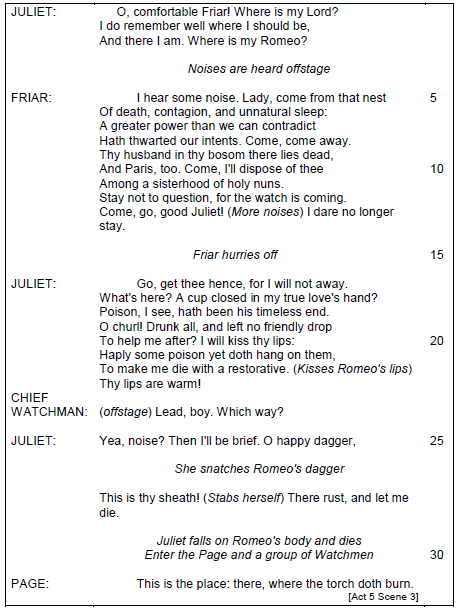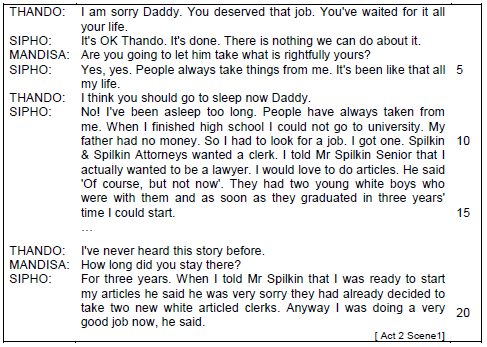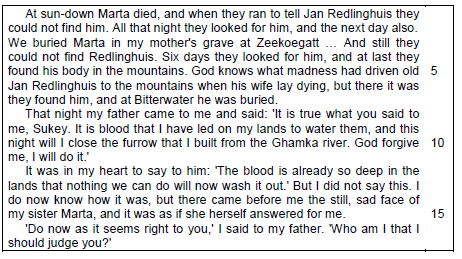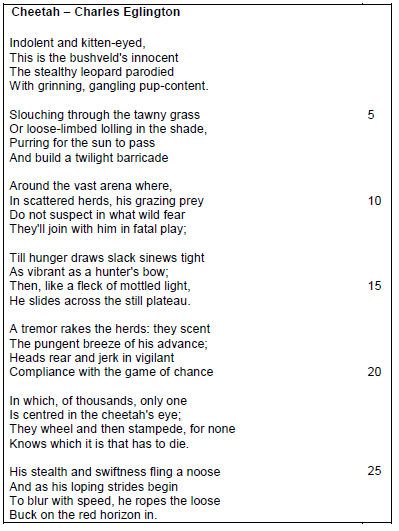ENGLISH FIRST ADDITIONAL LANGUAGE PAPER 2 GRADE 12 QUESTIONS - AMENDED SENIOR CERTIFICATE PAST PAPERS AND MEMOS MAY/JUNE 2017
Share via Whatsapp Join our WhatsApp Group Join our Telegram GroupENGLISH FIRST ADDITIONAL LANGUAGE PAPER 2
GRADE 12
SENIOR CERTIFICATE EXAMINATIONS
MAY/JUNE 2017
INSTRUCTIONS AND INFORMATION
Read this page carefully before you begin to answer the questions.
- Do NOT attempt to read the entire question paper. Consult the TABLE OF CONTENTS on the next page and mark the numbers of the questions set on the texts you have studied this year.
- This question paper consists of FOUR sections:
SECTION A: Novel (35)
SECTION B: Drama (35)
SECTION C: Short stories (35)
SECTION D: Poetry (35) - Answer TWO QUESTIONS from ANY TWO sections, as follows:
SECTION A: NOVEL
Answer the question on the novel that you have studied.
SECTION B: DRAMA
Answer the question on the drama that you have studied.
SECTION C: SHORT STORIES
Answer the questions on BOTH short stories.
SECTION D: POETRY
Answer the questions on BOTH poems.
Use the checklist on page 4 to assist you. - Follow the instructions at the beginning of each section carefully.
- Number the answers correctly according to the numbering system used in this question paper.
- Start EACH section on a NEW page.
- Spend approximately 60 minutes on each section.
- Write neatly and legibly.
TABLE OF CONTENTS
| SECTION A: NOVEL Answer ANY ONE question | ||
| QUESTION NO. | MARKS | PAGE NO. |
| 1. To Kill a Mockingbird | 35 | 5 |
| 2. Lord of the Flies | 35 | 9 |
| 3. A Grain of Wheat | 35 | 13 |
| SECTION B: DRAMA Answer ANY ONE question. | ||
| 4. Romeo and Juliet | 35 | 16 |
| 5. Nothing but the Truth | 35 | 20 |
| SECTION C: SHORT STORIES Answer the questions set on BOTH extracts. | ||
| 6.1 'Manhood' | 17 | 23 |
| 6.2 'The Sisters' | 18 | 24 |
| SECTION D: POETRY Answer the questions set on BOTH poems | ||
| 7.1 'On his blindness' | 17 | 26 |
| 7.2 'Cheetah' | 18 | 27 |
CHECKLIST
NOTE:
• Answer questions from ANY TWO sections.
• Tick (✓) the sections you have answered.
| SECTION | QUESTION NUMBERS | NO. OF QUESTIONS TO ANSWER | TICK (✓) |
| A: Novel | 1–3 | 1 | |
| B: Drama | 4–5 | 1 | |
| C: Short stories | 6 | 1 | |
| D: Poetry | 7 | 1 |
NOTE: Ensure that you have answered questions on TWO sections only.
SECTION A: NOVEL
In this section, there are questions set on the following novels:
- TO KILL A MOCKINGBIRD by Harper Lee
- LORD OF THE FLIES by William Golding
- A GRAIN OF WHEAT by Ngũgĩ wa Thiong'o
Answer ALL the questions on the novel that you have studied.
QUESTION 1: TO KILL A MOCKINGBIRD
Read the extracts from the novel below and answer the questions set on each. The number of marks allocated to each question serves as a guide to the expected length of your answer.
NOTE: Answer the questions set on BOTH extracts, i.e. QUESTION 1.1 AND QUESTION 1.2.
1.1 EXTRACT A
[Scout learns a lesson in manners from Calpurnia]
1.1.1 Choose a description from COLUMN B that matches the name in COLUMN A. Write only the letter (A–E) next to the question number (1.1.1(a)–1.1.1(d)) in the ANSWER BOOK.
| COLUMN A | COLUMN B |
|
|
(4 x 1) (4)
1.1.2 Why does Jem invite Walter Cunningham to dinner? (1)
1.1.3 Explain how the figure of speech in lines 1–2 ('… drowned his dinner in syrup') adds to the description of what Walter Cunningham does at the dinner table. (2)
1.1.4
- What does Walter Cunningham refuse to take from his Grade 1 teacher?(1)
- What does the Grade 1 teacher's offer to Walter reveal about her? State TWO different points.(2)
1.1.5 Explain the role that Calpurnia plays in the lives of the Finch children. (3)
1.1.6 Refer to line 12 ('He ain't company … just a Cunningham –').
What does this line tell us about Scout's attitude to Walter? (1)
1.1.7 The Cunninghams can be admired as a family. Discuss your view. (3)
AND
1.2 EXTRACT B
[Atticus's closing arguments to the jury]
1.2.1 Refer to lines 1–4 ('And so a … them for yourselves').
- Name the TWO people that Tom has to 'put his word against'. (2)
- Write down ONE word which best describes the two people Atticus is referring to. (1)
1.2.2 Who is Heck Tate? (1)
1.2.3 Quote SIX consecutive words from the first eight lines of the extract to show that the state witnesses are convinced that the jury will believe them. (1)
1.2.4 Choose the correct answer to complete the following sentence. Write only the letter (A–D) next to the question number (1.2.4) in the ANSWER BOOK.
'… a lie as black as Tom Robinson's skin' (lines 12–13) is an example of a …
- metaphor.
- pun.
- simile.
- hyperbole. (1)
1.2.5 Why is the statement below FALSE?
Atticus believes that Negro men are untrustworthy. (1)
1.2.6 Describe what eventually happens to Tom Robinson. (2)
1.2.7 State THREE character traits that this extract reveals about Atticus. (3)
1.2.8 Identify and discuss ONE theme of the novel that is evident in this extract. (3)
1.2.9 If you were a member of the jury, discuss why you will find Tom Robinson NOT GUILTY. (3)
[35]
QUESTION 2: LORD OF THE FLIES
Read the extracts from the novel below and answer the questions set on each. The number of marks allocated to each question serves as a guide to the expected length of your answer.
NOTE: Answer the questions set on BOTH extracts, i.e. QUESTION 2.1 AND QUESTION 2.2.
2.1 EXTRACT C
[Jack, Ralph and Simon explore the island]
2.1.1 Why do the three boys decide to explore the island? (2)
2.1.2 Refer to lines 1–2 ('Jack snatched from … into a trunk').
How does Jack's action here prepare the reader for later events? (2)
2.1.3 Refer to lines 6–8 ('You're no good … said Jack, flatly').
What does the way in which Ralph and Jack respond to Piggy suggest about them? (2)
2.1.4 Choose the correct answer to complete the following sentence. Write only the letter (A–D) next to the question number (2.1.4) in the ANSWER BOOK.
The boys do not want to take Piggy with them when they go to explore the island because Piggy ...
- is far too playful.
- has to count the boys.
- will slow them down.
- has to make the fire. (1)
2.1.5 Explain the role of the conch in this novel. (3)
2.1.6 Refer to line 14 ('Piggy hung bumbling behind them').
Discuss your feelings towards Piggy at this point in the novel. (3)
2.1.7 Quote SEVEN consecutive words from the first sixteen lines of the extract to prove that Simon was the shortest of the three boys who went to explore the island. (1)
2.1.8 Refer to line 24 ('You told 'em. After what I said').
- What has Ralph 'told 'em'? (1)
- What effect does this have on Piggy? (2)
AND
2.2 EXTRACT D
[Ralph runs away from Jack and his tribe]
2.2.1 Choose a description from COLUMN B that matches the name in COLUMN A. Write only the letter (A–E) next to the question number (2.2.1(a)–2.2.1(d)) in the ANSWER BOOK.
| COLUMN A | COLUMN B |
|
|
(4 x 1) (4)
2.2.2 Why is Ralph trying to hide in the jungle? (2)
2.2.3 Refer to lines 6–7 ('At that sound … he was panting').
- Identify the figure of speech. (1)
- Ralph has always stood for civilised values. What does this figure of speech reveal about Ralph at this point in the novel? (2)
2.2.4 Refer to line 9 ('Samneric were somewhere in that line, …').
- Why is the statement below FALSE?
Samneric is one of the boys stranded on the island. (1) - Why does Ralph hope that Samneric 'were somewhere in that line'?(1)
2.2.5 What is the 'death' that Roger carries in his hands? (1)
2.2.6 Identify and discuss ONE theme of the novel which is evident in this extract. (3)
2.2.7 Discuss your views on whether the setting of the novel has an influence on the boys' behaviour. (3)
[35]
QUESTION 3: A GRAIN OF WHEAT
Read the extracts from the novel below and answer the set questions. The number of marks allocated to each question serves as a guide to the expected length of your answer.
NOTE: Answer the questions set on BOTH extracts, i.e. QUESTION 3.1 AND QUESTION 3.2.
3.1 EXTRACT E
[Gikonyo visits Mugo]
3.1.1 Choose a description from COLUMN B that matches the words in COLUMN A. Write only the letter (A–E) next to the question number (3.1.1(a)–3.1.1(d)) in the ANSWER BOOK.
| COLUMN A | COLUMN B |
|
|
(4 x 1) (4)
3.1.2 Describe Mugo's relationship with his aunt. (2)
3.1.3 Why do Gikonyo and the others visit Mugo? (1)
3.1.4 Refer to lines 8–9 ('You know the … by the people').
State TWO points Gikonyo makes about the Kenyan government. (2)
3.1.5 Refer to lines 15–16 ('What do they … they really want?').
Identify and explain Mugo's state of mind in these lines. (2)
3.1.6 Quote THREE consecutive words to prove that the following statement is FALSE.
Mugo had a clear understanding of what Gikonyo was saying from the beginning of this visit. (1)
3.1.7 Identify and discuss ONE theme that is evident in this extract. (3)
3.1.8 Refer to the novel as a whole.
Discuss whether Mugo deserves admiration. (3)
AND
3.2 EXTRACT F
[Gikonyo returns home]
3.2.1 Choose the correct answer to complete the following sentence. Write only the letter (A–D) next to the question number (3.2.1) in the ANSWER BOOK.
Gikonyo has returned from …
- detention.
- the market.
- Mugo's place.
- Rira. (1)
3.2.2Refer to line 4 (' ''Karanja's child!'' she said bluntly').
Who tells Gikonyo that it is Karanja's child? (1)
Explain how this person feels about Mumbi having Karanja's child. (2)
3.2.3 Refer to line 6 ('But not this … this animal dumbness').
Explain how the metaphor used in this line adds to the mood at this point in the novel. (2)
3.2.4 Explain why Gikonyo should not refer to Karanja as 'my friend' (line 7). (2)
3.2.5 Refer to lines 16–17 ('Even the thought … to disturb him').
Gikonyo is described as 'detached' and 'disturbed'. Explain why he behaves in this manner? State THREE points. (3)
3.2.6 Refer to the novel as a whole.
Discuss Karanja's character. (3)
3.2.7 Refer to the novel as a whole.
Discuss whether you sympathise with Mumbi or Gikonyo. (3)
TOTAL SECTION A: 35
SECTION B: DRAMA
In this section, there are questions set on the following dramas:
- ROMEO AND JULIET by William Shakespeare
- NOTHING BUT THE TRUTH by John Kani
Answer the question on the drama that you have studied.
QUESTION 4: ROMEO AND JULIET
Read the extracts from the play below and answer the questions set on each. The number of marks allocated to each question serves as a guide to the expected length of your answer.
NOTE: Answer the questions set on BOTH extracts, i.e. QUESTION 4.1 AND QUESTION 4.2.
4.1 EXTRACT G
[Juliet learns that Romeo has slain Tybalt]
4.1.1 Choose a description from COLUMN B that matches the name in COLUMN A. Write only the letter (A–E) next to the question number (4.1.1(a)–4.1.1(d)) in the ANSWER BOOK.
| COLUMN A | COLUMN B |
|
|
(4 x 1) (4)
4.1.2 Why do Romeo and Juliet keep their marriage a secret? (1)
4.1.3 Briefly outline the events that lead to Tybalt's death. (3)
4.1.4 Refer to line 13 ('Back, foolish tears, back to your native spring!').
- If you were the stage director of this play, what would you tell the actress playing Juliet to do when performing this line? (1)
- Using your OWN words, show how the personification in this line explains Juliet's feelings in this extract. (2)
4.1.5 Refer to line 23 ('… and Romeo banishèd').
Choose the correct answer to complete the following sentence. Write only the letter (A–D) next to the question number (4.1.5(a)) in the ANSWER BOOK.
Prince Escalus banishes Romeo to …
- Verona.
- Florence.
- Mantua.
- Genoa. (1)
Explain why Romeo is banished and not put to death. (2)
4.1.6 Discuss your views on whether Juliet is justified in confiding in the nurse. (3)
AND
4.2 EXTRACT H
[Paris, Romeo and Juliet die.]
4.2.1 Paris sacrifices his life for Juliet. What does this reveal about him? (3)
4.2.2 Refer to line 15 ('Friar hurries off ').
What does this line suggest about Friar Laurence at this point in the play? (1)
4.2.3 Quote EIGHT consecutive words that tell the reader the cause of Romeo's death. (1)
4.2.4 Explain why Romeo is unaware of the fact that Juliet is not dead but in a deep sleep. (2)
4.2.5 Refer to lines 20–21 ('I will kiss … hang on them,').
Discuss what these lines reveal about Romeo's character. (3)
4.2.6 Why does Juliet say, 'O happy dagger' (line 25)? (2)
4.2.7 Discuss the theme of fate, evident in this play. (3)
4.2.8 Friar Laurence is to blame for the deaths of Romeo and Juliet. Discuss your view. (3)
[35]
QUESTION 5: NOTHING BUT THE TRUTH
Read the extracts from the play below and answer the set questions. The number of marks allocated to each question serves as a guide to the expected length of your answer.
NOTE: Answer the questions set on BOTH extracts, i.e. QUESTION 5.1 AND QUESTION 5.2.
5.1 EXTRACT I
[Mandisa and Thando are speaking about Themba.]
5.1.1 Choose a description from COLUMN B that matches the place in COLUMN A. Write only the letter (A–E) next to the question number (5.1.1(a)–5.1.1(d)) in the ANSWER BOOK.
| COLUMN A | COLUMN B |
|
|
(4 x 1)(4)
5.1.2 Refer to line 1 ('Were the people … him ever found?').
To whom does 'him' refer? (1)
5.1.3 Sipho and Thando have differing views on the TRC. How are their views different? (2)
5.1.4 Choose the correct answer to complete the following sentence. Write only the letter (A–D) next to the question number (5.1.4) in the ANSWER BOOK.
Mandisa's tone in line 14 ('My father? Why?') shows …
- regret.
- shock.
- delight.
- anger (1)
5.1.5 Explain what is meant by the figurative expression, '… he stepped into his shoes' in lines 16–17. (2)
5.1.6 Refer to line 21 ['uneasy pause. She comes back with the tea'].
- Why is this line written in italics? (1)
- Explain why there is an 'uneasy pause' in the conversation between Thando and Mandisa? (2)
5.1.7 Refer to the play as a whole.
Suggest TWO reasons why Temba had not returned to South Africa 'when Mandela was released' (line 26) (2)
5.1.8 In your opinion, is Sipho being fair when he blames Themba for Luvuyo's death? Discuss your view. (3)
AND
5.2 EXTRACT J
[Thando, Sipho and Mandisa are talking.]
5.2.1 Refer to lines 1–2 ('I am sorry … all your life').
- Which job does Sipho not get? (1)
- Give TWO possible reasons why Sipho is not given the job.(2)
5.2.2 What character traits are revealed about Sipho in this extract? (3)
5.2.3 Show ONE difference in the behaviour of Thando and Mandisa in this extract. (2)
5.2.4 Quote SIX consecutive words from the extract to show that Sipho does not always share information about his past with Thando. (1)
5.2.5 What does this extract reveal about the relationship between Thando and Sipho? (2)
5.2.6 Discuss the theme of injustice evident in this play. (3)
5.2.7 Refer to the play as a whole.
Discuss the relevance of the title, Nothing but the Truth. (3)
[35]
TOTAL SECTION B: 35
SECTION C: SHORT STORIES
In this section, there are questions set on the following short stories:
- 'MANHOOD' by John Wain
- 'THE SISTERS' by Pauline Smith
QUESTION 6
Read the extracts from the TWO short stories below and answer the questions set on each. The number of marks allocated to each question serves as a guide to the expected length of your answer.
NOTE: Answer the questions set on BOTH extracts, i.e. QUESTION 6.1 AND QUESTION 6.2.
'MANHOOD'
6.1 EXTRACT K
[Mr Willison calls Mr Granger.]
6.1.1 Refer to lines 1–4 ('Mrs Granger fetched … The line's bad').
- State TWO reasons why Mr Willison calls Mr Granger. (2)
- Explain the figurative meaning of line 4 ('The line's bad'). (2)
6.1.2 Why does Mr Granger say, 'Have you got the right person' (line 6)? (1)
6.1.3 Explain why Rob lies to his father about being selected for the boxing tournament. (2)
6.1.4 What excuse does Rob use to avoid the boxing tournament? (1)
6.1.5 Refer to line 18 ('Oh. Thank you. I must have – well, thank you').
- Choose the correct answer to complete the following sentence. Write only the letter (A–D) next to the question number (6.1.5(a)) in the ANSWER BOOK.
Mr Willison's thoughts here are …- inaccurate.
- irrelevant.
- confused.
- immature. (1)
- Explain why Mr Willison is personally involved in Rob's training. (2)
6.1.6 What character traits are revealed about Mrs Willison in this story? (3)
6.1.7 Do you think that the title, Manhood, is relevant? Discuss your view. (3)
AND
'THE SISTERS'
6.2 EXTRACT L
[Marta has died]
6.2.1 Choose a description from COLUMN B that matches the name in COLUMN A. Write only the letter (A–E) next to the question number (6.2.1(a) – 6.2.1(d)) in the ANSWER BOOK.
| COLUMN A | COLUMN B |
|
|
(4 x 1) (4)
6.2.2 State TWO ways in which Jan Redlinghuis humiliated Marta. (2)
6.2.3 Name the farm of:
- Burgert de Jager (1)
- Jan Redlinghuis (1)
6.2.4 Explain the irony of Burgert de Jager's words in lines 9–10 ('and this night … the Ghamka river'). (2)
6.2.5 Explain the emotion Sukey experiences in lines 12–13 ('It was in … not say this'). (2)
6.2.6 Identify and discuss the theme which is evident in Burgert de Jager's actions which led to Marta's death. (3)
6.2.7 Refer to the short story as a whole.
Discuss why you think the narrator does not reveal the cause of Jan Redlinghuis's death. (3)
[35]
TOTAL SECTION C: 35
SECTION D: POETRY
In this section, questions are set on the following poems:
- 'On his blindness' by John Milton
- 'Cheetah' by Charles Eglington
NOTE: Answer the questions set on BOTH poems, i.e. QUESTION 7.1 AND QUESTION 7.2.
QUESTION 7
7.1 Read the poem below carefully and then answer the questions which follow. The number of marks allocated to each question serves as a guide to the expected length of your answer.
7.1.1 This poem is a sonnet. Give the word for:
- The first eight lines (1)
- The last six lines (1)
7.1.2 What does the speaker mean by, 'my light is spent' (line 1)? (2)
7.1.3 Identify the sound device used in line 2. (1)
7.1.4 Refer to lines 3–6 ('And that one … he returning chide,').
Why does the speaker refer to the parable of The Talents? (2)
7.1.5 Refer to the structure of the poem.
- Identify the tone of the speaker in the first eight lines. (1)
- Why does this tone change in the last six lines? (3)
7.1.6 One of the themes of this poem is, 'The Kindness of God'. Discuss this theme with reference to the poem as a whole. (3)
7.1.7 The speaker says, 'who best Bear his mild yoke, they serve him best' (lines 10–11). Discuss whether you agree with his view. (3)
AND
7.2 Read the poem below carefully and then answer the questions which follow. The number of marks allocated to each question serves as a guide to the expected length of your answer.
7.2.1 Choose a description from COLUMN B that matches the word in COLUMN A. Write only the letter (A–E) next to the question number (7.2.1(a)–7.2.1(d)) in the ANSWER BOOK.
| COLUMN A | COLUMN B |
|
|
(4 x 1)
(4)
7.2.2 Choose the correct answer to complete the following sentence. Write only the letter (A–D) next to the question number (7.2.2) in the ANSWER BOOK.
The word 'indolent' in line 1 means …
- active.
- energetic.
- lively.
- lazy.(1)
7.2.3 Quote ONE word from Stanza 2 which indicates when the cheetah prefers to hunt. (1)
7.2.4 Give TWO reasons why the animals do not know that they are in danger. (2)
7.2.5 Refer to line 12 ('They'll join with him in fatal play;').
- Identify the figure of speech used here. (1)
- Explain this figure of speech. (2)
7.2.6 Give TWO possible reasons why the horizon is described as 'red' (line 28). (2)
7.2.7 Using your OWN words, explain how the mood in stanza 1 is different to that in stanzas 4–6. (2)
7.2.8 The speaker refers to the hunting by the cheetah as a 'game of chance' (line 20). Discuss whether you agree with this view. (3)
[35]
TOTAL SECTION D:35
GRAND TOTAL: 70